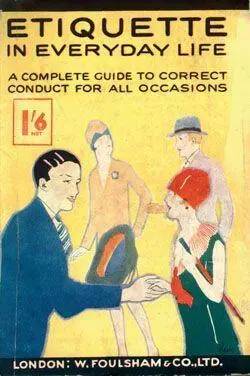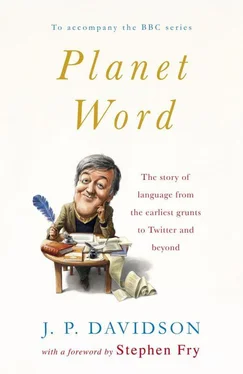
The BBC’s ‘Little Green Book’
The BBC had arguably lost the battle to protect its listeners even before ‘The Little Green Book’ was issued. The bawdy banter of the barracks had influenced a generation of servicemen and a new wave of comedians — the likes of Peter Sellers, Spike Milligan and Kenneth Williams — began to write and perform on radio. The Goon Show ’s Spike Milligan remarked that much of the show’s innuendo came from servicemen’s jokes, which were understood by most of the cast who had all served as enlisted soldiers and many of the audience, but not by the BBC managers, who were mostly ‘officer class’.
The most infamous hotbed of double entendre was the 1960s Radio 2 series Round the Horne , in which Kenneth Williams and fellow performers served up a half hour of wordplay, sexual innuendo and nonsense verse every Sunday afternoon. One of the regular characters was an English folk singer, Rambling Syd Rumpo, played by Williams, whose suggestive songs were filled with nonsense words like ‘grossets’ and ‘grommets’ and ‘nadgers’ and ‘moolies’.
In Hackney Wick there lives a lass
whose grummets would I woggle
Her ganderparts none can surpass
her possett makes me boggle!’
Music-hall entertainment died out with the success of television, but from the Carry On films to TV’s Morecambe and Wise and The Two Ronnies , the format of double entendre family entertainment continued through to the 1970s. The following extract from an episode of Are You Being Served? , the BBC department store sitcom, wouldn’t have felt out of place in a nineteenth-century musical hall.
Mrs Slocombe : Before we go any further, Mr Rumbold, Miss Brahms and I would like to complain about the state of our drawers. They’re a positive disgrace.
Mr Rumbold : Your what, Mrs Slocombe?
Mrs Slocombe : Our drawers. They’re sticking. And it’s always the same in damp weather.
Mr Rumbold : Really.
Mrs Slocombe : Miss Brahms could hardly shift hers at all just now.
Mr Lucas : No wonder she was late.
Mrs Slocombe : They sent a man who put beeswax on them, but that made them worse.
Mr Rumbold : I’m not surprised.
Miss Brahms : I think they need sandpapering.
There was a defining moment in TV comedy in the early 1980s when the Not the Nine O’Clock News team satirized a Two Ronnies sketch. Ronnie Barker and Ronnie Corbett’s trademark were their innuendo-laden songs.
The twittering of the birds all day, the bumblebees at play.
The twit! The twit! The twit! The twit! The twittering of the birds all day;
The bum! The bum! The bum! The bum! The bumblebees at play …
The Not the Nine O’Clock News sketch ‘The Two Ninnies’ sent up the whole double entendre genre by singing the intended word — or worse. It was knowingly clever in a very 80s way — what would now be called postmodern. It was basically calling the bluff of double entendre.
I spend all day just crawling through the grass
Thistles in me hair and bracken up me anus
I’m thrilled to bits to see a pair of tits
And I love to watch the sun go down
Oh vagina oh vagina over Chinatown
Nowadays, explicit sexual humour raises barely an eyebrow. As the comic writer and performer David Baddiel observes, ‘When, twenty years ago, Molly Sugden from Are You Being Served? would come on TV and say that it had been raining in the garden and her pussy was soaking wet, it was taken to mean “cat”, with a slight overtone of “vagina”. Today, it would mean “vagina”, with just a tiny undercurrent of “cat”.’ For the most part, the double entendre has been consigned to early-evening TV sitcoms and that great bastion of bawdy jokes, the pantomime. Stand-up, observational humour is the comedy of choice these days.
And yet … living as we do in a society which now talks so openly and frankly about sex, it is odd that we still rather hanker after our double entendres. The BBC Radio 4 programme I’m Sorry I Haven’t a Clue has been on air since 1972. It’s delightfully daft, full of wordplay and puns and absolutely heaving with innuendo — most of it aimed at Samantha, the show’s fictional scorer. Of a builder, ‘She was pleased to see his tender won but was startled when it suddenly grew to twice its size.’
From office humour to best men’s speeches, it seems we still like a bit of innuendo. Long may it continue.
Innuendo is one way cultures regulate social behaviour. The language of politeness is another way.
There’s an etiquette in grammar which anyone who’s learned a foreign language will probably have come across. Most of the Indo-European languages have two levels of grammatical politeness when addressing people. French has the less formal tu for children and friends and the formal vous for anyone else; Spanish has tu and Usted , German du and Sie , Russian t ы and Вы. English used to have two levels — you and the formal thou. Thou, thee and thine have virtually disappeared from day-to-day speech, although they can still be heard in some northern dialects and in a religious setting.
The Japanese language is famous for an extensive grammatical system which is used to express politeness and formality, depending on age, job and experience. There are three levels of politeness, all expressed through different verb endings and alternative expressions. These levels are colloquial, polite and honorific or keigo (literally respectful language ). There are two types of keigo : the polite honorific used when addressing someone of higher social status, like the boss at work, teachers or elders, and the humble one when you refer to yourself or family. Forms of keigo are found in Korean, Chinese and other Asian languages.
The three golden words of politeness in the English language are please, thank you and sorry and the English — the stereotypical English at least — are the world champions when it comes to using them. We are masters in the arts of supplication, gratitude and apology. ‘Sorry to bother you … Sorry, but can you help me please? Terribly sorry … Thank you. Thank you. Thank you.’

The 1920s guide to proper and correct conduct
Generations of children have been told to ‘mind your manners’ or ‘mind your Ps and Qs’. We presume the ‘Ps and Qs’ stand for ‘pleases and thank yous’, although I rather like the theory that the phrase comes from the days of the early printing presses, where mistakes were often made with the typesetting of the lower-case p s and q s. Anyway, the English are renowned for minding them. We’re also rather keen on the matter of table manners, queuing and the art of polite small talk. Discussing the weather is a speciality, as is the avoidance of the contentious subjects of politics, sex and religion.
Other nations have politeness encoded deep into their language and traditions. Iranian/Persian culture has a rather mystifying code of etiquette called taarof , which basically means to pay respect to someone. It involves elaborate compliments and praises and requires that you treat your guests and friends better than your own family. Taarof is a verbal dance between the person who is offering and the one who is receiving, a volley of insistence and refusal until one of them agrees. Taarof governs all levels of daily life, formal and informal — in the market place, shops, restaurants, offices and when entertaining guests at home.
Читать дальше














